
Turkey and China intend to triple bilateral trade to $50bn within five years, the countries’ leaders have said after meetings aimed at strengthening political and business ties.
At a joint news conference held in the Turkish capital Ankara, Tayyib Erdogan, the prime minister, said: “We set ourselves a timetable. We agreed to increase our trade volume to $50bn in 2015 and to $100bn in 2020.”
Erdogan’s Chinese counterpart, Wen Jiabao, hailed what he described as a new “strategic partnership”, saying he recognised Turkey’s “power and influence in the international community and its region”.
Both countries – the fastest growing economies in the world – sealed agreements to co-operate in energy, transport and infrastructure.
Erdogan said the two countries have also agreed to carry out their trade in their national currencies.
‘Important milestone’
Wen, the first Chinese premier to visit Turkey in eight years, said he wanted to “turn over a new leaf” in ties with Turkey. He also held talks with Abdullah Gul, the Turkish president, and business leaders before returning home on Saturday.
Turkey was the last stop on Wen’s European tour, which took him to Greece, Belgium and Brussels.
He described his two-day visit as an “important milestone in relations”.
Turkey’s ties with China have been strained at times, notably over Beijing’s approach to unrest in Xinjiang, home to China’s Muslim Turkish minority Uighurs.
The two leaders did not, however, address one of the few areas of tension in bilateral ties.
Hundreds of Uighur Turks held demonstrations during Wen’s visit, denouncing Beijing’s handling of the unrest which killed 184 people in Xinjiang in 2009.
Turkey accepts China’s sovereignty over Xinjiang, but last year heavily criticised the deadly violence in the region, which it described as “atrocities”.
Wen’s tour of Europe was also overshadowed by a dispute with the European Union and the US over the level of the yuan.
In the Greek capital Athens, he pledged investment and support to debt-stricken Greece and announced the creation of a $5bn fund to help finance the purchase of Chinese ships by Greek shipping companies.
In Brussels, Wen fended off European pressure to raise the value of the yuan before sealing business deals worth $3.15bn in Rome.
Trade ‘imbalance’
The trade volume between Turkey and China stood at $14.2bn in 2009 – $12.6bn of which consisted of Chinese exports.
Wen said his country was not opposed to looking into ways to redress the imbalance. “The Chinese side will carry out a study in order to sustain our trade without giving a huge deficit,” he said.
One of the agreements would open the way for the joint construction of 4,500km of railway in Turkey, Erdogan said, adding that efforts would now focus on finding the necessary finance for the project.
Chinese companies are already involved in the construction of railroads for two high-speed train links, he added.
Turkey and China are also involved in projects to build oil pipelines from Iran.
Joint military exercise
Turkish newspapers reported last week that Chinese warplanes took part in a military training exercise at an airbase in central Turkey, in what appeared to be the first such drill involving Beijing and a Nato member country.
The Turkish army has not confirmed the exercise.
Turkish press reports also said the Chinese-Turkish manoeuvres took place on September 20 through October 4 at the Konya air base in Turkey’s central Anatolia region – before Wen’s visit.
“To the best of our knowledge, US-made F-16s were not involved in the exercise,” Lieutenant Colonel Tamara Parker, a defence department spokeswoman, said on Friday.
Another Pentagon official, who asked not to be identified, said indications were that the Turkish air force flew F-4 Phantom fighters, used extensively by the US during the Vietnam war, while China flew Russian-built SU-27s.
China, according to reports, has also developed a surface-to-surface rocket-launching system together with Turkey.

Leave a Reply